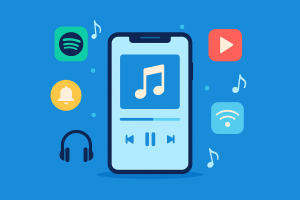The necessity of clear memory Cleaning your phone isn't just a matter of space, but also performance. A cluttered device tends to operate slower, consume more battery, and even experience app malfunctions. By using the right apps, you can remove unnecessary files, manage background applications, and optimize the operating system, providing a longer lifespan and a more enjoyable experience for your device. Furthermore, many of these apps offer additional features beyond simple cleaning, such as malware detection and privacy protection.
Advantages of Applications
Performance Optimization
Firstly, by freeing up system space and resources, these apps help restore the speed and fluidity of your smartphone, thus optimizing the user experience and making browsing more enjoyable.
Freeing up storage space
Secondly, they identify and remove temporary files, application caches, and residual data, ensuring you have more space for new photos, videos, and other important files.
Efficient Application Management
Furthermore, some of these apps allow you to uninstall multiple programs at once or identify which ones consume the most resources, making it easier to control what is installed on your device.
Increased Battery Lifespan
Furthermore, by closing background applications and optimizing processes, many of these utilities contribute to reducing energy consumption, consequently extending the battery life of your device.
Enhanced Security
Finally, some cleaning apps also include security features, such as detecting malicious files and protecting your privacy, providing more peace of mind when using your mobile phone.
How to Use the Apps
Step 1: Access your mobile phone's app store (Google Play Store for Android or Apple App Store for iOS).
Step 4: After installation, open the application and grant the necessary permissions so that it can access and analyze your storage.
Step 5: Usually, the app will offer an "Analyze" or "Scan" option. Tap it to identify unnecessary files.
Step 6: Review the analysis results. Applications often categorize files as "Large files," "Junk," "Application cache," etc.
Step 7: Select the items you want to remove and confirm the action, following the on-screen instructions. Be careful not to delete important files.
Step 8: For further optimization, explore other app features such as "App Manager" or "Battery Saver," if available.
Step 9: Repeat the process periodically, preferably once a month, to keep your phone's memory optimized and performance at its best.
Recommendations and Care
To ensure that using cleaning apps yields the best results without compromising security, some points deserve attention. First, it's crucial to download apps only from official stores, such as the Google Play Store and the Apple App Store. Avoid unknown sources to prevent the installation of malware or fraudulent apps. Furthermore, when granting permissions, carefully read what access the app is requesting. A cleaning app shouldn't need access to your entire list. The truth is that performance gains are gradual and depend on the initial state of your device. Additionally, avoid having multiple cleaning apps installed on the same phone, as they may conflict or consume more resources than they provide. Choose a good app and stick with it.
For better performance, it's recommended to go beyond cleaning with apps. Manually review your files regularly. Delete duplicate or unnecessary photos and videos. Consider using cloud storage services, such as Google Photos or Dropbox, to free up physical space on your device. Additionally, check which apps are consuming the most data or battery in the background and, if possible, restrict their use or disable this functionality. To deepen your knowledge about maintaining the health of your smartphone, you can consult detailed information on reliable technology websites, such as [website name - missing from original text]. TechTudo, which offers guides on how to speed up your device and optimize battery life, complementing the work of cleaning apps.
Common questions
Yes, it's safe, as long as you download apps from trusted sources like the Google Play Store or the Apple App Store, and grant permission. The ideal frequency varies depending on usage, but a general cleanup every month or every two months is sufficient for most users. If you notice slowdowns, you can do it sooner.
Generally, no. They are designed to identify temporary files and junk. However, always review the list of items the application suggests deleting before confirming, in order to avoid mishaps.
Clearing the cache refers to deleting temporary application data, which can be recreated. Freeing up space is a more comprehensive action that removes larger, unnecessary files, such as old downloads and residual files.
Many of them do. By closing background processes and disabling energy-intensive features, some cleaning apps help extend battery life by optimizing consumption.



